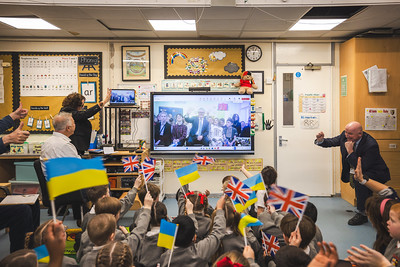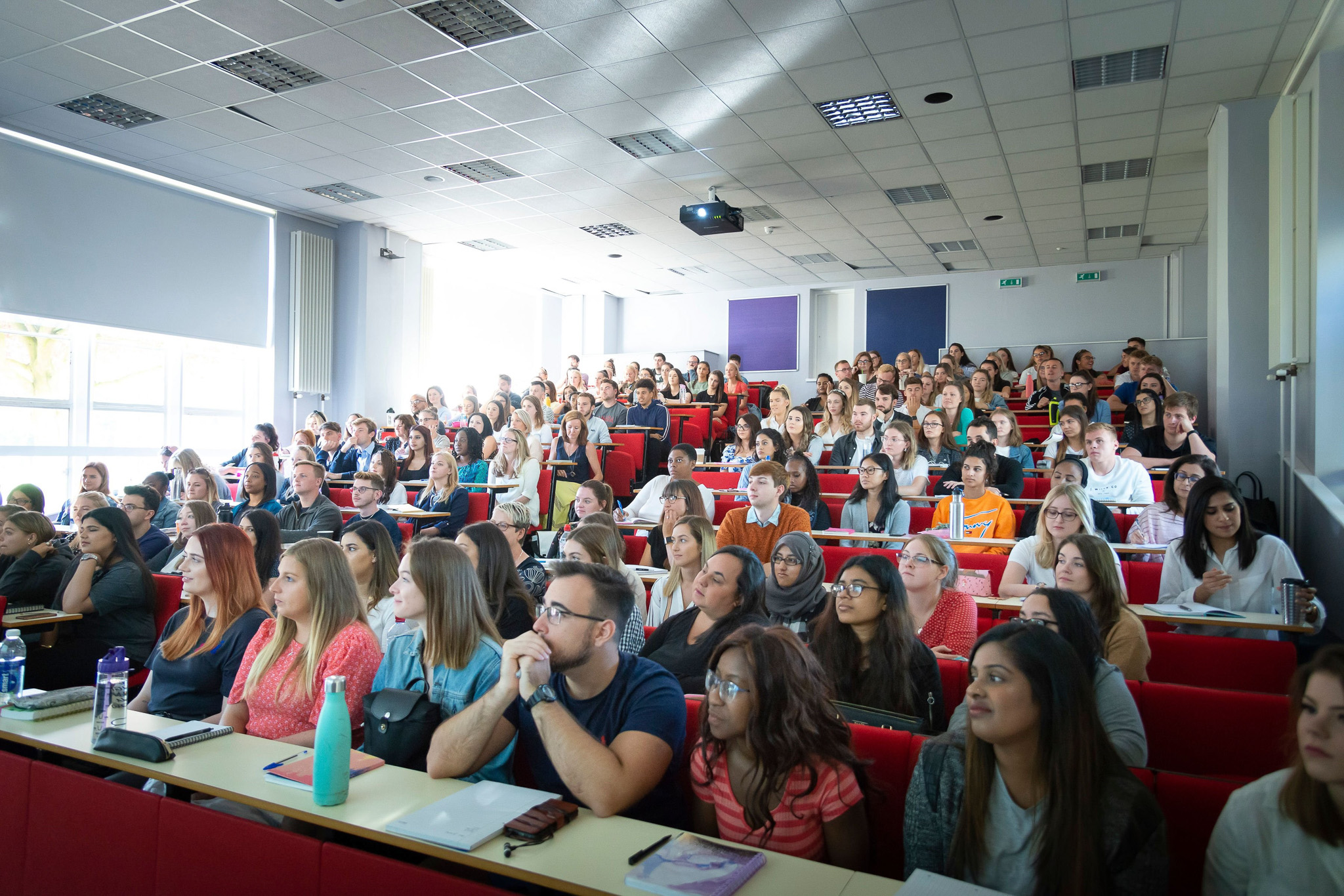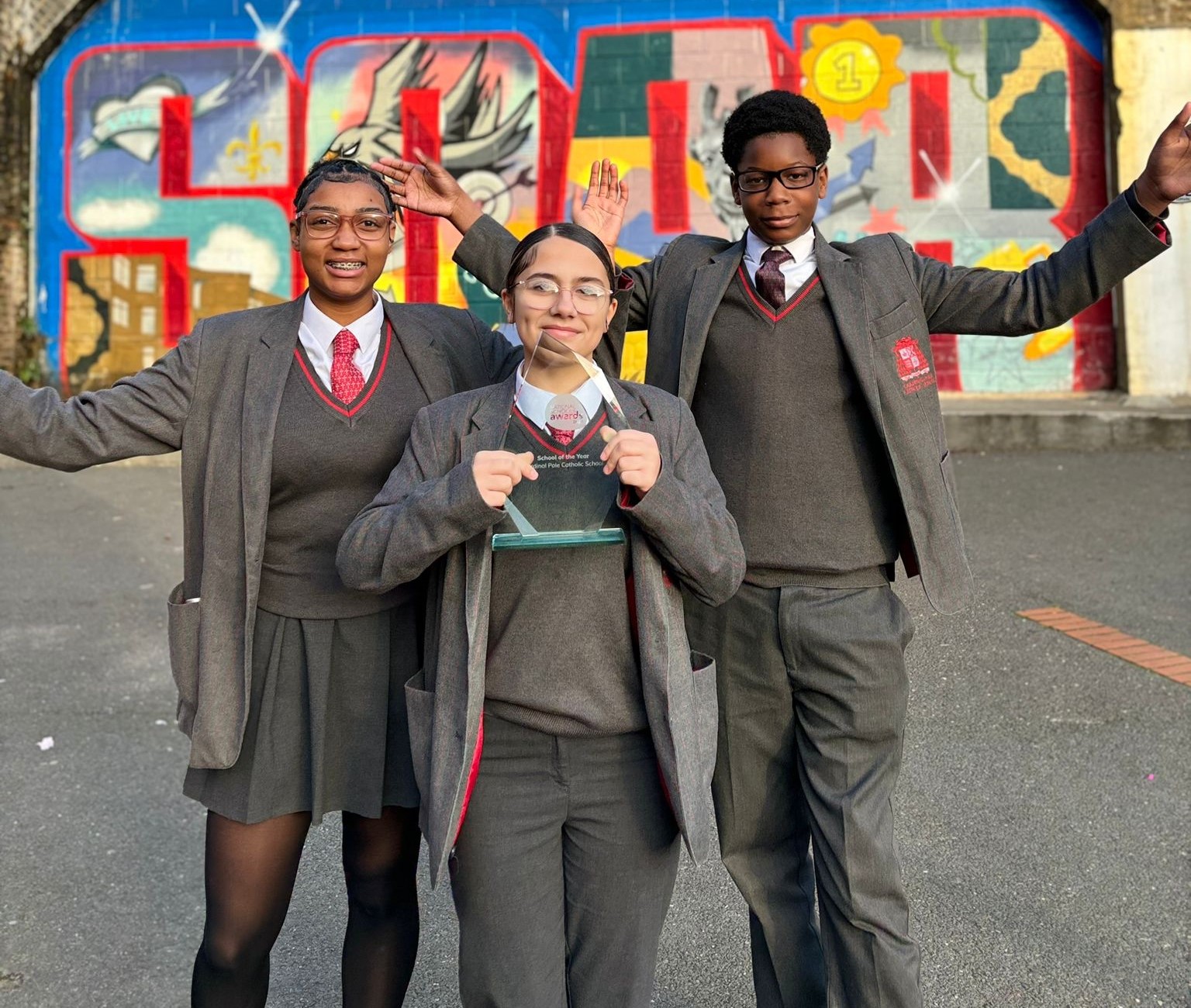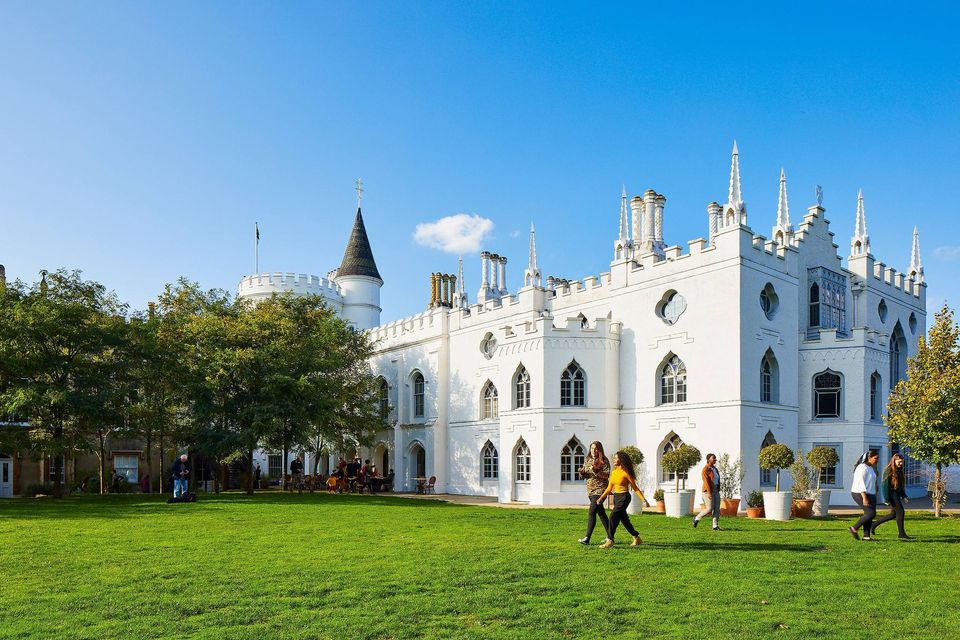School News (166)
Prime Minister and Secretary of State at Catholic school for UK-Ukraine scheme launch
 Pupils and staff at All Saints Catholic Primary School in Anfield (pictured), in the Archdiocese of Liverpool, were overjoyed to welcome a number of illustrious visitors to the school on Thursday (16 January).
Pupils and staff at All Saints Catholic Primary School in Anfield (pictured), in the Archdiocese of Liverpool, were overjoyed to welcome a number of illustrious visitors to the school on Thursday (16 January).
Children were amazed when the Prime Minister, Sir Keir Starmer, came in from All Saints’ partner school No 219, in Kyiv, Ukraine, where he joined them on a video call with pupils. Also in attendance was the Secretary of State for Education, Bridget Phillipson MP, along with the Permanent Secretary to the Department for Education, Susan Acland-Hood. War Horse author Sir Michael Morpurgo, and current Waterstones children’s laureate Frank Cottrell-Boyce, read beautifully to the children and answered questions about their careers and their love of reading.
They had gathered at the school to launch a new government initiative which will link schools in the UK and Ukraine to swap stories and run joint reading projects in order to strengthen the relationship between the countries and boost education standards.
The UK-Ukraine Schools Partnership programme, delivered by the British Council in partnership with the National Literacy Trust, will see 50 schools in the UK matched with 50 schools in Ukraine on a year-long project.
Schools will be chosen from across the four nations of the UK between now and the scheme’s launch in late spring. Each school group will share their favourite stories from their own culture and explore the benefits of reading.
All Saints’ executive headteacher Jeremy Barnes explained that the partnership is one of many curated by the school over the past fifteen years. He said: "Our children have developed links with children in Belgium, Spain, China and in Sierra Leone as well as Ukraine, working alongside fantastic partners such as the British Council.
"After Pope Francis wrote Laudato Si' in 2014, we made a commitment to put this at the heart of our curriculum, extending the hand of friendship across borders, learning about each other whilst always caring for this common home we share. The joy of reading is one expression of that common bond."
Staff and pupils are preparing for further work this year alongside School No 2019 in Kyiv, whilst also preparing for a Y5 and Y6 visit to Seville in May where they are working with a Colegio San Francisco de Paula on environmental challenges they can address together.
Find out more about Catholic education in the Archdiocese of Liverpool
Photograph by Getty Images, from the 10 Downing Street Flickr account
Child poverty in England and Wales: survey report
Catholic schools are often on the front lines of the fight against child poverty, providing crucial support to families facing hardship.
This report, published by the CES and Catholic Bishops' Conference, draws on insights from more than 2,000 Catholic schools in England and Wales provided during November and December, 2024. It presents a comprehensive analysis of the challenges posed by child poverty and measures implemented to address them.
It reveals how 94% of Catholic schools provide support for the cost of school uniforms, and 77% operate breakfast clubs, to make sure no child starts the school day hungry, having had no breakfast.
Further findings include:
- Barriers to learning: over 90% of Catholic schools reported encountering families struggling with the cost of living, and 70% noted worsening conditions over the past year.
- Mental health challenges: 88% of Catholic schools observed a strong connection between poverty and poor mental health, with financial instability exacerbating stress, anxiety, and depression among pupils and their families.
- School-based support: Catholic schools are implementing a wide range of initiatives, including breakfast clubs, uniform support, food bank referrals, and the provision of essential supplies.
The survey report is available to download below.
Formatio: grow your own trainee teachers with paid internships
 Why isn’t teaching represented at careers fairs?
Why isn’t teaching represented at careers fairs?
It was this observation that led to the launch earlier this year of the Plant The Seed paid internship scheme aimed at Catholic school alumni across the Archdiocese of Westminster.
In June university students at the end of their second year will undertake a three-week internship in schools within the Archdiocese. They will receive £300 per week to cover expenses, along with a programme of lesson observation, paired teaching opportunities, mentoring, meeting with early career teachers, and training in safeguarding and lesson planning.
The students then have the option of registering with an Initial Teacher Training provider such as All Saints Catholic Academy Trust; Diocese of Westminster Academy Trust; or Saint John Southworth Catholic Academy Trust, supported by Twickenham-based St Mary’s (pictured), one of four Catholic universities in England.
A bursary is also available for those choosing to train as a Religious Education (RE) teacher in secondary schools, in a bid to tackle a national shortage in the subject.
The Plant The Seed initiative is being led by Catherine McMahon, Deputy Director of diocesan education service. She said: “I noticed that you have all these professions represented at careers fairs — but not teaching.
“The leaders of tomorrow’s schools are in our schools today, so we’re now putting students on the path to Catholic universities and multi-academy trusts offering teacher training.”
The internship is funded by the Cardinal’s Lenten Appeal, and is the first stage in a multi-year programme of continuing professional development and leadership development for teachers, including flexible working options to retain existing staff and support those returning to the profession.
Five students have signed up to the scheme so far, with more expected to join as the academic year progresses. Last summer seven students took part, who are now considering careers in teaching as they approach the end of their third year at university.
The Formatio partnership supports the CES and diocesan schools commissions to work with the four Catholic universities and Catholic multi-academy trusts in implementing strategies for school leadership and governance, as commissioned by the Bishops in 2017.
‘It helps them concentrate, but it also helps to get the children in school’: case study of a Catholic school breakfast club
 For 13 years a free breakfast club at a voluntary aided Catholic school in Merseyside has been helping tackle child poverty, improve concentration and – since the pandemic – boost attendance.
For 13 years a free breakfast club at a voluntary aided Catholic school in Merseyside has been helping tackle child poverty, improve concentration and – since the pandemic – boost attendance.
Two thirds of pupils at Our Lady Star of the Sea Catholic Primary School, in Seaforth, Archdiocese of Liverpool, are eligible for Free School Meals and the Pupil Premium, more than double the national average.
Each day every pupil from Reception to Year 6 are offered fruit, cereal, toast, baked beans and a bagel from 8am, as well as occasional porridge, and hot chocolate milk on cold days. This is supported through local partnerships with Magic Breakfast and Tesco arranged by Deanne Arden, the school’s Business Manager.
She said: “We are in an area of high deprivation. They might arrive in school hungry, but they're not hungry for the rest of the morning, having health food at the start of the day. It helps them concentrate, but it also helps to get the children in school.”
This has helped improve attendance since the pandemic, particularly from pupils with anxiety or emotional school avoidance behaviour, who appreciate the calming, social environment before classes and schoolwork begin.
Parents are grateful to drop off their child early so they can then make sure their older children get to secondary school on time. After hours Our Lady Star of the Sea also offers wraparound childcare to support parents.
Headteacher Claire Roberts said: ”With the cost of living crisis, we know how hard it is for our working families, so the free breakfast club gives our parents the flexibility to go to work and to not worry about the costs of childcare.”
Further initiatives to relieve child poverty include a second-hand uniform service, while parents donate non-uniform clothes their children have outgrown which are then made available to others in need.
Pupils also receive vouchers from the parish branch of the St Vincent de Paul charity, with donations providing vouchers, toys and pyjamas for pupils, in addition to Free School Meal vouchers designed to provide food during school holidays.
Our Lady Star of the Sea has also received the national School of Sanctuary award for welcoming refugee and asylum seeker children.
Miss Arden said: “When we've had new people start and new arrivals new to the country, we've given them the uniform that we have here. If children come in not wearing a coat, we will give them a coat that's been donated to us.”
Find out more about Catholic education in the Archdiocese of Liverpool
Social justice champions: how Catholic schools work with Metro Mayors and local government
 Catholic schools across the country are working with Metro Mayors, regional government and local authorities on social justice issues like child poverty and youth mental health.
Catholic schools across the country are working with Metro Mayors, regional government and local authorities on social justice issues like child poverty and youth mental health.
This is due to Catholic Social Teaching, which is based on the encyclicals of current and former Popes, and principles such as solidarity and subsidiarity, to provide a framework for contemporary practical application.
A £1 bus fare cap for under-21s – campaigned for by St Thomas More Catholic Sixth Form students – was extended in November by the new Mayor of the North East, Kim McGuinness (pictured, centre, with St Thomas More representatives), potentially until 2028, as part of a package of measures she launched to tackle child poverty.
Students from the sixth form, which is in North Shields, Hexham and Newcastle Diocese, had previously persuaded a former North of Tyne Mayor to introduce the fare cap in 2023.
At Runnymede St Edward’s Catholic Primary School, in Liverpool Archdiocese, Metro Mayor Steve Rotheram saw how artificial intelligence (AI) has used data to identify gaps in pupils’ learning and tailor support accordingly.
In October the Mayor announced a pilot of the AI service for all schools in the region, delivered by education technology company CENTURY, during an event at Runnymede St Edward’s, with pupils interviewed on BBC Radio 4’s Today programme.
In Bristol, St Bede’s Catholic College headteacher, Robert King, worked with Mayor Dan Norris and the West of England Combined Authority to introduce a new bus service. This was to partly replace one cut by operator First Bus, a decision which had been negatively affecting students and local residents.
School-based mental health counselling for all Year 9s was launched in October by Brighton and Hove Council, a city-wide pilot initiative introduced after successful representations from Cardinal Newman Catholic School.
The Arundel and Brighton Diocese-based secondary had previously worked with local NHS services for nearly a decade to help support students experiencing mental health issues.
Find out more about Catholic Social Teaching in schools
Catholic primary school tops Sunday Times list
 St Filumena’s Catholic Primary School, in Stoke-on-Trent, has scooped the accolade of Primary School of the Year in the West Midlands 2025, in the new Sunday Times Parent Power schools guide.
St Filumena’s Catholic Primary School, in Stoke-on-Trent, has scooped the accolade of Primary School of the Year in the West Midlands 2025, in the new Sunday Times Parent Power schools guide.
Edward Howard, Executive Principal at the Birmingham Archdiocese-based school, said the announcement was a testament to the hard work and commitment of everyone connected to the school.
He said: “We are absolutely thrilled, this is fantastic news for the St Filumena’s family. To be named Primary School of the Year in the West Midlands is a huge achievement. Everyone at St Filumena's believes that education involves more than just delivering the National Curriculum. We equip our pupils with the skills and attitudes they need to become confident, independent and successful learners based on our Catholic values.
“Our motto 'I am loved' serves as a constant reminder to all to achieve their true potential as a unique child of God. The school has high expectations of all pupils regardless of ability, creed or gender. We instil our pupils with a sense of personal and collective responsibility, and we place a great emphasis on the personal, social, spiritual and health education of our pupils.
“The school works to enable everyone to become a responsible, happy and tolerant citizen in order to prepare them for the opportunities, responsibilities and experiences of life in our rapidly changing society.”
Mr Howard explained the school’s curriculum vehicles are learning themes taught alongside the National Curriculum and often go beyond its scope to equip pupils with essential skills necessary for the future, incorporating teamwork, relationships, cultural appreciation, managing time and resources, as well as global awareness and responsibility.
In October, Ofsted judged St Filumena’s to be outstanding in all areas of work, achieving the highest possible recognition, stating: "This school provides an exceptional standard of education because of the clear vision and supportive culture that has been developed. In partnership with the trust, leaders are insistent that every pupil will achieve well.”
Earlier this year St Filumena’s received three letters for academic achievements from the Minister of Schools. The first letter recognised the school as being in the top 1% of primary schools nationally for end of primary school achievement; the second for being in the top 200 schools nationally for the Year 4 multiplication check; and the third for being in the top 1% of primary schools nationally for Year 1 phonics, with 100 percent of pupils in Year 1 at St Filumena’s meeting the expected standard.
St Filumena’s also holds an Artsmark Silver Award; CAFOD’s LiveSimply Award and Excellence in Music Gold Award.
The school is part of the Painsley Catholic Academy group of schools in north Staffordshire.
Catholic secondary wins National Schools Awards School of the Year category
 Cardinal Pole Catholic School, in Hackney, Westminster Archdiocese, has been won the prestigious School of the Year category at the National Schools Awards 2024.
Cardinal Pole Catholic School, in Hackney, Westminster Archdiocese, has been won the prestigious School of the Year category at the National Schools Awards 2024.
The National Schools Awards celebrate excellence across the education sector. Schools are shortlisted in one of eight categories, with a panel of industry experts selecting the winners. Judges from the National Governance Association and the Confederation of School Trusts use their expertise to recognise schools demonstrating outstanding achievement.
This award recognises schools that have significantly improved pupil outcomes, overcome challenges, or shown exceptional dedication to their communities. Judges agreed that Cardinal Pole Catholic School provides outstanding educational outcomes for their students, making them a deserving winner.
The announcement was made last night during a ceremony at the House of Lords. Baroness Berridge, former Parliamentary Under-Secretary of State for the School System, praised the awards for recognising the “skill, commitment, and hard work it takes to deliver the best possible education.” These values are central to everything we do at Cardinal Pole.
Adam Hall, Executive Headteacher, said: "I would like to personally thank everyone who makes our school such a special place—from our students and their families to our dedicated staff, who work tirelessly to ensure each student has the opportunity to soar. This award is a testament to the collective effort of our community, and we remain focused on continuing to deliver an outstanding education for all our students.”
Alex O’Donoghue, Head of School, said: "Every member of Cardinal Pole—students, staff, and families—has contributed to making our school an outstanding place of learning and growth. I am immensely proud of what we have achieved together and excited about what lies ahead as we continue to strive for excellence."
Shiphrah, Oyinlola, and Tommy, Head Students, said: "Cardinal Pole is more than a school; it’s a family where everyone is supported to achieve their best. This award celebrates not just our achievements but also the sense of community and care that makes our school so unique. We are proud to represent such an inspiring place."
Find out more about Cardinal Pole Catholic School
St Mary’s University announces plans to open school of medicine
 St Mary’s (pictured), one of four Catholic universities in England, has announced plans to open a new school of medicine on its Strawberry Hill campus in Twickenham.
St Mary’s (pictured), one of four Catholic universities in England, has announced plans to open a new school of medicine on its Strawberry Hill campus in Twickenham.
The announcement comes after the General Medical Council (GMC) provided assurance that St Mary’s is currently on track and making good progress towards required standards for medical education. The university will initially be recruiting international students and plans to welcome its first cohort in September 2026.
Speaking of the news, St Mary’s University (SMU) Vice-Chancellor Professor Anthony McClaran said: “The launch of a school of medicine is a cornerstone of the university’s plan for strategic growth and is in keeping with our tradition of delivering a sustained, positive impact on society.
“The school will not only contribute to the workforce development demands in the UK for more doctors and medical professionals, but it will also train global professionals able to work anywhere in the world. Our approach to developing the whole person during students’ time at SMU will mean medics of the future will leave this university with the technical and personal skills they need to deliver truly holistic, compassionate, patient-centred care.”
Interim Founding Dean of the School of Medical Professor Michael Bewick added: "Complemented by the existing successful Allied Health and Sports Science provision, St Mary’s is the natural place to establish a forward-thinking centre of medical training. I am delighted we are making consistent steps forward in making this ambition a reality.”
In a further development, SMU has also signed a new curriculum partnership with the University of Central Lancashire. The partnership will see SMU use the University of Central Lancashire’s Bachelor Medicine Bachelor Surgery curriculum in the development of the School of Medicine and their commitment as SMU’s contingency partner throughout the GMC accreditation process.
Pro Vice-Chancellor (Health and Campus Development) Professor Cathy Jackson was the Founding Head of the University of Central Lancashire’s Medical School. She joined the institution in 2014 to set up the university’s medical school and led the team through to full accreditation of the programme by the GMC.
Professor Jackson said: “Opening a brand-new medical school will present St Mary’s University with the ability to teach the next generation of professionals in a modern way.
“When the University of Central Lancashire opened its new medical school, my team had the unique opportunity of writing a curriculum from scratch that would be fit for the long-term future.
“The University of Central Lancashire’s Medical School will now support St Mary’s new medical school as it’s contingent partner as it progresses through all the stages to full GMC accreditation, and I’m delighted they’ll now deliver the curriculum we created to their new cohort of students.”
St Mary's new school of medicine will benefit from the latest technology, new facilities, and advanced teaching practices, building on its proven history of teaching excellence and student satisfaction. SMU is currently placed in the Top 10 nationally for student experience and the Top 5 nationally for teaching quality in The Times and Sunday Times Good University Guide 2024.
The GMC oversees both undergraduate and postgraduate medical education and training in the UK. Any institution looking to establish a new medical school or training programme must demonstrate that it meets the GMC’s standards by being subject to an extensive period of quality assurance. SMU is pleased to have been granted permission to move to the next phase of its School of Medicine and the University will be submitting further evidence to GMC as it works towards the final timetable.
Once complete, SMU’s new medical school will operate alongside health and medical schools at England's three other Catholic universities: Birmingham Newman University, Leeds Trinity University and Liverpool Hope University.
Find out more about the School of Medicine
Watch Prof Anthony McClaran and Prof Michael Bewick discuss the St Mary's School of Medicine
Ways to increase primary school pupil numbers
The following are tried and tested methods discussed at a recent training session arranged by the Diocese of Westminster Education Service.
Warning signs could be falling rolls every year, and not being the first choice for increasing numbers of pupils.
Potential solutions:
- make contact with local pre-schools and nurseries, ensure school’s marketing materials displayed and available
- invite pre-schools and nurseries to use school’s resources and attend taster days
- arrange reading sessions for pre-school and nursery children with school’s Year 6 pupils
- Record in database contact details not just of every prospective parent emailing the school to enquire about places, but also those phoning up or visiting reception
- use database to invite prospective parents to open days, at which school choir sing
- write to thank prospective parents for attending open day, invite them to ask questions
- email Christmas messages to prospective parents – ie ensure regular contact
- plan a school tour route for prospective parents, choose and carefully train pupils in how to be guides
- without clear instructions pupils may spend the tour focusing on their favourite or least favourite parts of the school, which may not align with what a prospective parent needs to see
- headteachers could attend Mass in nearby churches and introduce the school, and be available to talk to prospective parents at the end
- spread these responsibilities across several staff members, make sure everyone aware of efforts to reverse falling school rolls
- don’t leave it all up to one already very busy staff member
The training was delivered by education marketing consultancy Grebot Donnelly Associates - for a free one-to-one meeting contact Aimee Monteith at Ця електронна адреса захищена від спам-ботів. Вам необхідно увімкнути JavaScript, щоб побачити її.
For further advice on increasing pupil numbers for schools, contact your diocesan education service or schools commission
Case study: Sacred Heart Catholic School - helping Camberwell through the cost of living crisis
Sacred Heart Catholic School is an oversubscribed mixed secondary in Camberwell, Southwark Archdiocese, of more than 850 pupils. For the last 20 years, it has been the, or one of the, top performing secondary schools in the borough of Southwark.
A third of pupils are eligible for Free School Meals and just under 50% receive the Pupil Premium. In the last academic year Sacred Heart Catholic School’s Progress 8 score put it in 11th place in the country.
Pupil Premium funding is focused partly on improving pupil-teacher ratio – a vital tool for ensuring individual pupils’ success. Pupil-teacher ratios range from 1:30 for more academic children to 1:15 for those pupils needing extra help and support.
The school’s sixth form is equally successful, sending pupils to Oxford, Cambridge, and Russell Group universities and to Ivy League universities in the USA. The school fundamentally believes that creating trust within the community and, in particular, with parents is vital to the overall success of the school.
Supporting the marginalised
Supporting charities and the marginalised, defenceless and poor in the community is part of the school’s Catholic ethos. The school emphasises how it is possible for all to improve the lives of those less fortunate and therefore encourages the pupils to appreciate more of what they have.
Pupils and staff engage in fundraising includes activities such as car washing, raffles, carol singing, penalty scoring, bake sales, and form group stalls during Charity Week. This culminates in the annual school Bridge Walk that includes up to 700 pupils and staff participating in a sponsored walk along the Thames and over London’s bridges. These activities generally raise more than £10,000 in the course of a year for the local community.
In addition, every form group produces Christmas hampers for isolated, elderly and housebound residents in the local area, with 150 hampers hand-delivered by pupils in the run-up to Christmas last year. They also fundraise to buy Christmas gifts for more than 100 children elsewhere in the parish who would not otherwise receive any due to the increasing cost of living in inner London. Form groups donate gloves, jumpers, socks and other essential winter items to a nearby charity for military veterans. The idea of charity as the main vehicle for children to live their faith is important to the fundamental values that the school holds.
“Through living our faith we help pupils understand that there’s always someone worse off than ourselves. Money’s always tight, but we’re a tight community as well.”
Serge Cefai, Headteacher 2005–2023
Breakfast club, homework space
Other strategies are put in place to ensure that, whenever possible, compensatory factors account for individual pupils’ circumstances. Examples are provision of a warm space from 7.30am when the school opens, with breakfast provided for pupils assessed as in need. Sacred Heart acts as a back-up facility for out of hours study when this is not possible at home due to circumstances. This includes extended opening times in the school library from 7.30am-5.30pm daily, as well as a supervised homework room.
The school prioritises building up trust through a strong emphasis on pastoral care. Pastoral teams meet very regularly and huge efforts are made to ensure that individual pupils’ circumstances are assessed. This enables intervention strategies to be implemented, for example for pupils without any basic stationery at home, wifi, or laptops, while sharing rooms with multiple siblings. The school supplies these items along with its supervised out of hours homework space on site.
Crisis support
In addition, families experiencing severe difficulties are supported. This might include issues such as housing, immigration, and carer responsibilities that the cost of living crisis has worsened, and which can negatively affect pupils’ wellbeing at home. The school employs an Attendance and Support Officer who supports the work of the school in addressing issues of school attendance and welfare and, when necessary, visits families in their homes. The officer identifies issues early and facilitates family meetings with agencies, sometimes advocating on their behalf, to prevent or minimise disruption to children’s education.
For households in crisis, several procedures are put in place including a dedicated staff member who among other things provides a school uniform mending service, along with second-hand uniforms and a stock of shoes. The pastoral team identifies when a child is in need of Free School Meals and encourages parents to apply. The school intervenes to provide meals in advance of local authority funding, in some extreme cases conducting a weekly shop at local supermarkets, replacing fire-damaged beds, and any other desperately needed items for families assessed as in extreme difficulty due to the economic climate.
Moral education
At Key Stage 3, bespoke life skills lessons are taught that cover and exceed the national curriculum, emphasizing the importance of budgeting, savings and basic economics.
Parental engagement is again a fundamental tool for overall success. Pupils’ performance at school is ranked in order of academic achievement and behavioural criteria, so parents can see at a glance how their child is doing. Inspired by football league tables, and published on noticeboards outside classrooms, this approach has motivated pupils both to national educational success and to embody the school’s Catholic ethos. Truth and transparency leading to trust is, again, fundamental to the successful running of this high achieving school.
“As well as outstanding academic outcomes, Sacred Heart prides itself on educating the whole child. Academic results will only go so far, and we insist on a comprehensive programme of moral education, teaching good manners and respect. We are determined to show our pupils that Gospel values are to be lived by, especially when it comes to looking after and caring for those less fortunate.”
Richard Lansiquot, Headteacher, 2023-present
Find out more about the ethos of Sacred Heart Catholic School

